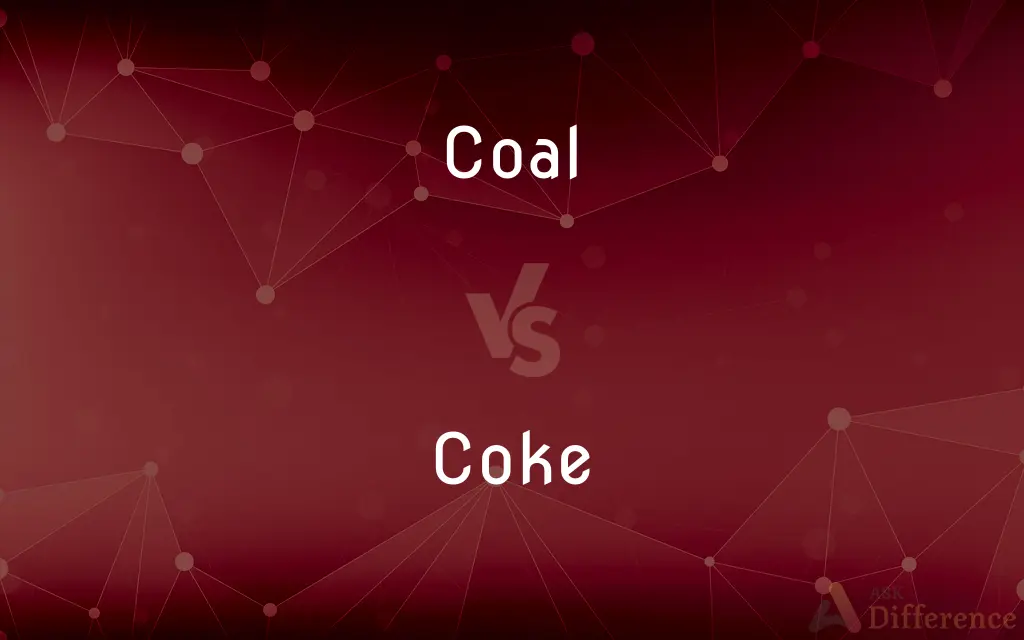Coal vs. Coke — What's the Difference?
Edited by Tayyaba Rehman — By Maham Liaqat — Updated on April 23, 2024
Coal is a naturally occurring fossil fuel primarily used for energy, whereas coke, a coal derivative, is primarily used as a reducing agent in iron production.

Difference Between Coal and Coke
Table of Contents
ADVERTISEMENT
Key Differences
Coal is extracted from the earth through mining operations, forming from ancient plant material under heat and pressure over millions of years. Coke, on the other hand, is produced by heating coal in the absence of air, a process known as coking.
While coal contains a variety of combustible materials, including carbon, hydrogen, oxygen, and nitrogen, coke is almost pure carbon, produced by driving off impurities to increase carbon content.
Coal is used widely in power generation to produce electricity through combustion. Conversely, coke is essential in metallurgy, particularly in the production of iron and steel, where it serves as both a fuel and a reducing agent.
The production of coke involves specific types of coal, known as coking coals, which have particular properties that allow them to soften, swell, and then re-solidify into a porous structure. Coal used for energy can be of various grades, including lignite, bituminous, and anthracite, depending on its carbon content.
Environmental impacts differ significantly; burning coal releases higher amounts of pollutants and greenhouse gases compared to coke, which is mostly carbon and has fewer impurities like sulfur and ash.
ADVERTISEMENT
Comparison Chart
Composition
Mixture of carbon, hydrogen, oxygen, etc.
Primarily carbon, with few impurities
Usage
Energy generation, heating
Reducing agent in metal production
Production Process
Mined from the earth
Produced from coal by coking
Environmental Impact
Higher pollution and greenhouse gases
Lower due to high carbon purity
Types/Grades
Lignite, bituminous, anthracite
Metallurgical coke, petroleum coke
Compare with Definitions
Coal
A natural fossil fuel formed from the decomposition of plant material over millions of years.
Coal mining remains a vital economic activity in many regions.
Coke
Less polluting than coal when burned, due to its higher carbon purity.
Coke emissions are less harmful than those from raw coal.
Coal
Subject to environmental concerns due to carbon emissions.
The use of coal has been criticized for contributing to global warming.
Coke
A carbon-rich material derived from coal through coking.
Coke is primarily used in the steel industry.
Coal
Used primarily for burning to generate electricity and heat.
Many old factories used coal as their main energy source.
Coke
Produced in special coking ovens that heat coal in the absence of oxygen.
Coke production requires high temperatures and controlled environments.
Coal
Contains various grades including lignite, bituminous, and anthracite.
Anthracite coal burns hotter and cleaner than other coal types.
Coke
Serves as a reducing agent to extract iron from its ore.
The production of steel involves the use of coke to remove oxygen from iron ore.
Coal
Mined using surface and underground methods.
Surface mining can alter landscapes extensively.
Coke
Characterized by its porosity and strength, crucial for supporting iron ore in blast furnaces.
The structural integrity of coke enables efficient iron smelting.
Coal
A combustible black or dark brown rock consisting chiefly of carbonized plant matter, found mainly in underground seams and used as fuel
A coal fire
Two bags of coal
Coke
Cocaine.
Coal
Coal is a combustible black or brownish-black sedimentary rock, formed as rock strata called coal seams. Coal is mostly carbon with variable amounts of other elements, chiefly hydrogen, sulfur, oxygen, and nitrogen.
Coke
(uncountable) Solid residue from roasting coal in a coke oven; used principally as a fuel and in the production of steel and formerly as a domestic fuel.
Coal
Provide with a supply of coal
Ships had to be coaled and supplied
Coke
The solid residue of impure carbon obtained from bituminous coal and other carbonaceous materials after removal of volatile material by destructive distillation. It is used as a fuel and in making steel.
Coal
A natural dark brown to black graphitelike material used as a fuel, formed from fossilized plants and consisting of amorphous carbon with various organic and some inorganic compounds.
Coke
To convert or be converted into coke.
Coal
A piece of this substance.
Coke
To affect or intoxicate with cocaine.
Coal
A glowing or charred piece of solid fuel.
Coke
Cocaine.
Coal
Charcoal.
Coke
Alternative case form of Coke.
Coal
To burn (a combustible solid) to a charcoal residue.
Coke
Alternative case form of Coke.
Coal
To provide with coal.
Coke
Senseid|en|any soft drink, regardless of type}} {{alternative case form of Coke.
Coal
To take on coal.
Coke
(transitive) To produce coke from coal.
Coal
(uncountable) A black or brownish black rock formed from prehistoric plant remains, composed largely of carbon and burned as a fuel.
The coal in this region was prized by ironmasters in centuries past, who mined it in the spots where the drainage methods of the day permitted.
Coke
(intransitive) To turn into coke.
Coal
(countable) A type of coal, such as bituminous, anthracite, or lignite, and grades and varieties thereof, as a fuel commodity ready to buy and burn.
Put some coal on the fire.
Order some coal from the coalyard.
Coke
To add deleterious carbon deposits as a byproduct of combustion.
In kerolox engines, some of the fuel flow cokes in the engine's cooling passages over time, requiring thorough cleaning prior to reuse.
Coal
(countable) A piece of coal used for burning this use is less common in American English
Put some coals on the fire.
Coke
Mineral coal charred, or depriver of its bitumen, sulphur, or other volatile matter by roasting in a kiln or oven, or by distillation, as in gas works. It is lagerly used where smokeless fire is required.
Coal
(countable) A glowing or charred piece of coal, wood, or other solid fuel.
Just as the camp-fire died down to just coals, with no flames to burn the marshmallows, someone dumped a whole load of wood on, so I gave up and went to bed.
Coke
To convert into coke.
Coal
Charcoal.
Coke
Carbon fuel produced by distillation of coal
Coal
(intransitive) To take on a supply of coal (usually of steam ships).
Coke
Coca Cola is a trademarked cola
Coal
(transitive) To supply with coal.
To coal a steamer
Coke
Street names for cocaine
Coal
(intransitive) To be converted to charcoal.
Coke
Become coke;
Petroleum oils coke after distillation
Coal
(transitive) To burn to charcoal; to char.
Coal
(transitive) To mark or delineate with charcoal.
Coal
A thoroughly charred, and extinguished or still ignited, fragment from wood or other combustible substance; charcoal.
Coal
A black, or brownish black, solid, combustible substance, dug from beds or veins in the earth to be used for fuel, and consisting, like charcoal, mainly of carbon, but more compact, and often affording, when heated, a large amount of volatile matter.
Coal
To burn to charcoal; to char.
Charcoal of roots, coaled into great pieces.
Coal
To mark or delineate with charcoal.
Coal
To supply with coal; as, to coal a steamer.
Coal
To take in coal; as, the steamer coaled at Southampton.
Coal
Fossil fuel consisting of carbonized vegetable matter deposited in the Carboniferous period
Coal
A hot glowing or smouldering fragment of wood or coal left from a fire
Coal
Burn to charcoal;
Without a drenching rain, the forest fire will char everything
Coal
Supply with coal
Coal
Take in coal;
The big ship coaled
Common Curiosities
How is coke produced from coal?
Through the process of coking, where coal is heated in the absence of air.
Which is more environmentally damaging?
Coal, due to higher emissions of pollutants and greenhouse gases.
Can coke be used for power generation?
It is not commonly used for power generation due to its specific properties and higher cost.
Which releases more CO2 when burned?
Coal, due to its impurities and lower carbon purity.
Is coke more expensive than coal?
Yes, generally, due to the additional processing required.
What are the differences in composition between coal and coke?
Coal contains various impurities; coke is almost pure carbon.
What is coal used for?
Primarily for energy production and heating.
What is coke used for?
Mainly as a reducing agent in the smelting of iron.
What types of coal are used to produce coke?
Metallurgical coals, which have properties suitable for coking.
How do the mining processes for coal and coke differ?
Coke is not mined; it is manufactured from coal.
Share Your Discovery

Previous Comparison
Numbskull vs. Numskull
Next Comparison
Cladding vs. LaggingAuthor Spotlight
Written by
Maham LiaqatEdited by
Tayyaba RehmanTayyaba Rehman is a distinguished writer, currently serving as a primary contributor to askdifference.com. As a researcher in semantics and etymology, Tayyaba's passion for the complexity of languages and their distinctions has found a perfect home on the platform. Tayyaba delves into the intricacies of language, distinguishing between commonly confused words and phrases, thereby providing clarity for readers worldwide.













































